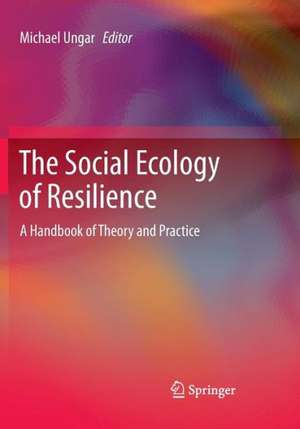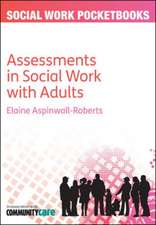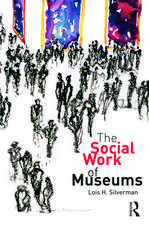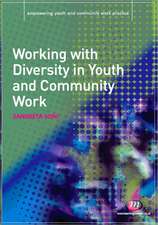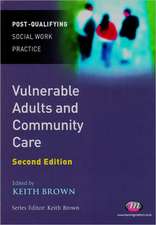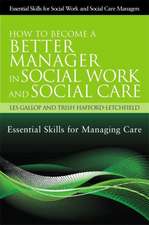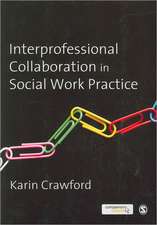The Social Ecology of Resilience: A Handbook of Theory and Practice
Editat de Michael Ungaren Limba Engleză Paperback – 6 iun 2013
| Toate formatele și edițiile | Preț | Express |
|---|---|---|
| Paperback (1) | 794.25 lei 6-8 săpt. | |
| Springer – 6 iun 2013 | 794.25 lei 6-8 săpt. | |
| Hardback (1) | 966.27 lei 6-8 săpt. | |
| Springer – 7 oct 2011 | 966.27 lei 6-8 săpt. |
Preț: 794.25 lei
Preț vechi: 968.60 lei
-18% Nou
Puncte Express: 1191
Preț estimativ în valută:
151.98€ • 159.13$ • 126.06£
151.98€ • 159.13$ • 126.06£
Carte tipărită la comandă
Livrare economică 09-23 aprilie
Preluare comenzi: 021 569.72.76
Specificații
ISBN-13: 9781461480921
ISBN-10: 1461480922
Pagini: 480
Ilustrații: XV, 463 p. 14 illus.
Dimensiuni: 178 x 254 x 33 mm
Greutate: 0.79 kg
Ediția:2012
Editura: Springer
Colecția Springer
Locul publicării:New York, NY, United States
ISBN-10: 1461480922
Pagini: 480
Ilustrații: XV, 463 p. 14 illus.
Dimensiuni: 178 x 254 x 33 mm
Greutate: 0.79 kg
Ediția:2012
Editura: Springer
Colecția Springer
Locul publicării:New York, NY, United States
Public țintă
Professional/practitionerCuprins
I. Introduction to the Theory.- Social Ecologies and their Contribution to Resilience.- Resilience: Causal Pathways and Social Ecology.- Theory and Measurement of Resilience: Views from Development.- Resilience and Children's Work in Brazil: Lesson from Physics for Psychology.- II. Five Interviews.- An Interview with Macalane Malindi: The Impact of Education and Changing Social Policy on Resilience During Apartheid and Post-Apartheid in South Africa.- An Interview with Bill Strickland: How Community-based Adult Educational Facilities can Lift People out of Poverty in Urban America.- An Interview with Jude Simpson: Growing Beyond a Life of Abuse and Gang Involvement in New Zealand.- An Interview with Vicki Durrant: Creating a Community Program for High-Risk Aboriginal Youth in Canada's North.- An Interview with Arn Chorn-Pond: Helping Children in Cambodia Through the Revival of Traditional Music and Art.- III. The Individual (in context).- From Neurons to Social Context: Restoring Resilience as a Capacity for Good Survival.- Situating Resilience in Developmental Context.- Temporal and Contextual Dimensions to Individual Positive Development: A Developmental-Contextual Systems Model of Resilience.- Girls' Violence: Criminality or Resilience?- IV. The Family.- Facilitating Family Resilience: Relational Resources for Positive Youth Development in Conditions of Adversity.- Contexts of Vulnerability and Resilience: Childhood Maltreatment, Cognitive Functioning and Close Relationships.- Averting Child Maltreatment: Individual, Economic, Social and Community Resources that Promote Resilient Parenting.- Caring Relationships: How to Promote Resilience in Challenging Times.- Young People, Their Families and Social Supports: Understanding Resilience with Complexity Theory.- V. The School.-Local Resources and Distal Decisions: The Political Ecology of Resilience.- Caring Teachers: Teacher-youth Transactions to Promote Resilience.- Children with Disabilities and SupportiveSchool Ecologies.- Resilience in Schools and Curriculum Design.- VI. The Community.- How Prior Social Ecologies Shape Family Resilience Amongst Refugees in U.S.Resettlement.- Young People, Sexual Orientation, and Resilience.- Community Resilience: Fostering Recovery, Sustainability, and Growth.- The Social Ecology of Resilience in War-Affected Youth: A Longitudinal Study from Sierra Leone.- Traveling Through Social Support and Youth Civic Action on a Journey Towards Resilience.- VII. Culture.-Understanding Culture and Resilience: The Production of Hope.- Case Study: Promoting Community Resilience with Local Values - Greenland's Paamiut Asasara.- Toward an Ecology of Stories: Indigenous Perspectives on Resilience.- Macro, Meso and Micro Perspectives of Resilience During and After Exposure to War.- Predictors of resilient psychosocial functioning in Western Australian Aboriginal Young People Exposed to High Family-level Risk.
Notă biografică
Michael Ungar, Ph.D. is the author of 9 books and more than 70 articles and book chapters. His works include The We Generation:Raising Socially Responsible Kids, Too Safe for Their Own Good: How Risk and Responsibility Help Teens Thrive, Counseling in Challenging Contexts,and Strengths-based Counseling with At-risk Youth. He has practiced for over 25 years as a Social Worker and Marriage and Family Therapist with children and families in child welfare, mental health, educational and correctional settings. Now a University Research Professor, and Professor at the School of Social Work, at Dalhousie University in Halifax, Canada, he leads an international team of resilience researchers that spans more than a dozen countries on six continents. In addition to his research and writing interests, Dr. Ungar maintains a small family therapy practice for troubled children, youth and their families.
Textul de pe ultima copertă
In a time of increasing exposure to personal psychological stress, as well as war, natural disasters, and economic upheaval, positive development under adversity—resilience—is meriting wider and deeper study. Despite this attention and over four decades’ worth of robust literature, resilience remains difficult to define and even harder to measure.
Taking the view that resilience is a process to be developed and nurtured rather than a hard-wired capacity of the individual, The Social Ecology of Resilience explains how interactions with school, family, community, and culture can provide ingredients for positive development. Case studies representing international and cross-disciplinary perspectives (e.g., Aboriginal youth in Australia, refugees in Sudan, and gay teens in the U.S.) demonstrate resilience across cultures and the lifespan. And interviews with healers and activists who have themselves survived trauma reveal resilience as a set of processes that can be both learned and taught.
Featured in the coverage:
Taking the view that resilience is a process to be developed and nurtured rather than a hard-wired capacity of the individual, The Social Ecology of Resilience explains how interactions with school, family, community, and culture can provide ingredients for positive development. Case studies representing international and cross-disciplinary perspectives (e.g., Aboriginal youth in Australia, refugees in Sudan, and gay teens in the U.S.) demonstrate resilience across cultures and the lifespan. And interviews with healers and activists who have themselves survived trauma reveal resilience as a set of processes that can be both learned and taught.
Featured in the coverage:
- Causal pathways and how social ecologies influence resilience.
- Situating resilience in developmental contexts.
- Fostering recovery, sustainability, and growth in traumatized communities.
- Resources that promote resilient parenting.
- Children with disabilities and the supportive school.
- Indigenous perspectives on resilience.
Caracteristici
Offers an ecological basis for understanding resilience Provides a comprehensive look at how culture and context affect positive outcomes to adverse circumstances Includes contributions from renowned international scholars Considers both Western and non-Western approaches Includes supplementary material: sn.pub/extras
